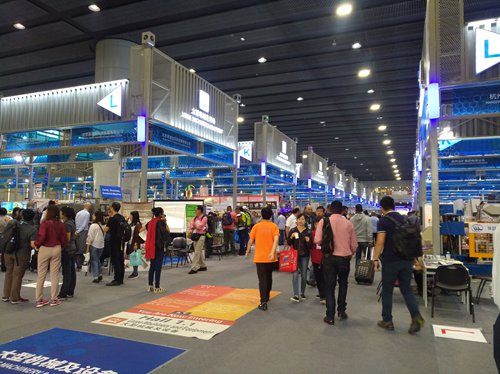China's foreign trade in the coming months is expected to post stable growth, while improving in terms of quality despite soft external demand. The impact of the China-US trade tensions is also under control, the Spring session of China's largest trade fair shows.

Buyers visit the large machinery and equipment section of the 125th Canton Fair. (Photo: Yang Kunyi/Global Times)
Chinese vendors participating in the 125th China Import and Export Fair, also known as the Canton Fair, which opened on Monday in Guangzhou, capital of south China's Guangdong Province, are trying to reach more buyers from emerging markets, especially in Belt and Road Initiative (BRI) economies, and promote exports of higher value-added products to offset the impact of the China-US trade war.
To diversify the nation's trading partners and improve product quality are all means to buffer the uncertainty stemming from the US' unilateral behavior and improve the efficiency of foreign trade, analysts said.
Chen Jie, sales manager from Ruian Senli Automobile Appliance Co, told the Global Times that the company's US performance was affected by the trade war but it has been developing other markets to increase sales.
"We are indeed losing US clients," Chen said. "Many of our clients in the US are worried that the trade war means we would increase our selling prices.
"But there was an increase in our trade with Russia last year, which has kept our business stable so far," Chen added.
Alden Zhao, sales manager of the Caston Group Co, a household appliances manufacturer and exporter, told the Global Times that the company hopes to make more connections with companies in Asian countries such as South Korea and India during this trade fair.
Companies from emerging economies are increasing their presence in this session of the Canton Fair. BRI countries and regions account for the majority of importers with 21 countries, making up 55 percent of the imports section and filling 630 booths, a press release from the trade fair showed.
Some emerging-market countries, including the Philippines, Israel and Ukraine, are participating for the first time, the press release read.
Sang Baichuan, director of the Institute of International Business at the University of International Business and Economics, told the Global Times that China needs to reduce dependence on developed markets and seize the opportunity provided in the growth of emerging economies.
"The long-term orders are set to drop as economic globalization comes across setbacks such as the trade friction and Brexit," Sang said. "But the growth of emerging economies will bring opportunities."
Andy Ye, president of Ningbo Luckibuy Import & Export Co, a specialized manufacturer and exporter of auto accessories based in East China's Zhejiang Province, told the Global Times that although the key target market for his business is the US, he remains optimistic about his business prospects in the coming year.
"Last year because of the trade friction between China and the US, there was a lot of pressure and panic about losing our clients in the US and rising competition from other countries, such as Vietnam," Ye said. "But so far my business has remained largely unaffected. The 10-percent tariff is still well within our capacity to keep our price advantage in the business."
Ye believes that his confidence mostly comes from an established supply chain and the company's industry experience.
Smaller Chinese vendors, which are under more pressure, are improving their products' technology and enhancing innovation to boost exports.
Zhao said that the company has invested in a coffee art printer that can print patterns on the foam of coffee beverages instead of putting money into traditional coffee machines.
"Markets for smaller companies producing coffee machines are very competitive and sensitive to prices. This year a lot of our clients are concerned about the influence of the trade war so we decided to invest in more innovative products, including this coffee art printer," Zhao said.
China's products are particularly popular in emerging markets due to a great price advantage compared with products from developed economies, Bai Ming, deputy director of the Institute of International Market Research of the Chinese Academy of International Trade and Economic Cooperation, told the Global Times on Monday.
The quality of China's products, which is still improving, is better than what's offered by other emerging economies, Bai added.


